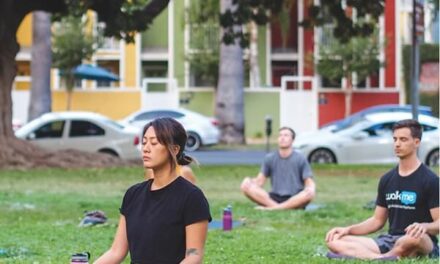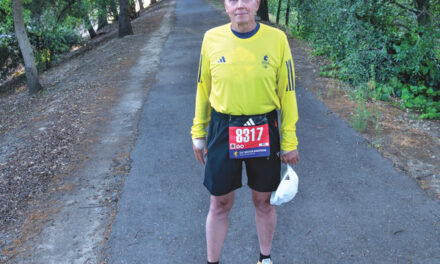‘Egregious Situations’
Mayoral candidates discuss homeless, housing
December 2023
First of Three Parts
Inside Sacramento interviewed the four candidates for mayor in the March 5 primary election—Flojaune Cofer, Steve Hansen, Kevin McCarty and Dr. Richard Pan. The top two finishers will advance to a runoff in November if no candidate receives at least 50.1% of the March vote. The election is nonpartisan.
Cofer is policy director for Public Health Advocates, a nonprofit that promotes community health care. This is her first run for public office.
Hansen is a managing partner for Lighthouse Public Affairs, a corporate consulting firm. He served as a City Council member for eight years.
McCarty is a five-term state assemblymember and former City Council member, where he served 10 years.
Pan, a pediatrician, is a former state senator and assemblymember, serving two terms in each house. This is his first campaign for city office.
Interviews were edited for clarity and length.
Do you support District Attorney Thien Ho’s efforts to resolve the city’s homeless crisis?
Cofer: No. He’s been in the job for eight months and some of the ways he’s engaging are disingenuous. The county has an $8 billion budget and has not provided the mental health support or substance-abuse support needed for our community. The city has been doing the lion’s share, trying to address homelessness, but not always with the outcomes we all want to see. He’s trying to make a play for some national attention or something, but not doing something useful.
Hansen: I do support it. It’s an unfortunate situation that it’s come to this. I still think that there’s a path for the city, working with the DA and the community. But what the DA is doing has put even more spotlight on the tools that we’re not using. To make people feel like while we’re trying to help folks, we’re also keeping our neighborhoods safe. And these encampments that the DA is focused on, I’ve read the lawsuit. They’re egregious situations.
McCarty: Yes. But I think the homeless crisis needs to be solved by all of us. All levels of government. We’re all in this together. Community, nonprofits and different levels of government, city, county, state and federal, and I don’t have a problem with what Ho is pushing. The city must take more action. But I think at the end of the day, we all need to work on this together in unison and I think that is the best path forward.
Pan: Yes. Thien Ho is raising the issue that so many Sacramentans are raising—that we need to do more about the homeless crisis. He’s using his office to push the city to enforce its laws and to act. As mayor, I will be a partner in being sure that we restore order to our public spaces and that we actually help the homeless.
Should city ordinances on camping, parking and sidewalk clearances be enforced?
Cofer: This is complicated. I will say yes and no. It’s totally reasonable for us to want to have clear sidewalks and not have people camping on front lawns. But we have to be able to answer the question of where people can go. It’s immoral as humans that we tell people they can’t be somewhere without being able to answer the obvious question of where can I be?
Hansen: Absolutely. We need to maintain a balance between helping people and making sure that if you have a business or you’re visiting Sacramento or in your neighborhood, you can walk down the street and feel comfortable. If you’re visiting, you shouldn’t feel like you’re taking your life in your hands. And I know too many horror stories of things that have happened in our own neighborhood, whether it’s a duplex and a fourplex across the street from us that were burned down by warming fires, or next door to the daycare, where there are encampments, needles, feces and no help from the city.
McCarty: Yes. We need clarity on where people cannot have urban camping. My kids last year were walking home from middle school, and they had to walk around camps and into the street. They couldn’t walk on the sidewalks. This was near a middle school. We shouldn’t have camps in front of businesses. But conversely, we have failed in telling people where they can’t go.
Pan: Yes.
Should unhoused people be immune from misdemeanor citations?
Cofer: Nobody should be immune from misdemeanor citations. There are rules in place to keep our society intact. The challenge comes when we unfairly enforce those rules or use them because people are poor and don’t have a place to be.
Hansen: There is no one above or below the law. We need to make sure the laws are enforced, city laws, county laws, state laws, federal laws. One of the unique things now is we stopped any routine enforcement thanks to someone’s idea that folks would behave themselves. But we haven’t seen that happen. We have to show we can balance both sides. This means making sure that if you do bad things, you hurt other people, you steal, you do drugs, you cause problems, there’s a consequence. And show we’re going to help those people get off the streets and get the services they need.
McCarty: Everyone should be accountable for laws they follow and don’t follow.
Pan: No, they should not be immune from misdemeanor citations. But we need to be sure we are using effective means. Just putting everyone in jail, or fining people who have no money is not particularly effective. We do need to think about appropriate consequences when people violate the law, including misdemeanors.
Do unhoused people have a right to refuse services and camp day and night on public property?
Cofer: Those are two separate questions, so let me answer them separately. As Americans, we have the right to refuse services. However, as a public health professional, most of the people I’ve interfaced with who are unhoused want services, but all services are not equal. We need to be clear about the fact that just because someone says no doesn’t mean that they’re saying no to everything. When we have effective people who know how to do this work, the answer is usually yes. People have the right to refuse, but they won’t refuse if you offer something good.
Hansen: If you are voluntarily homeless, because you’ve refused services, you shouldn’t have the right to camp anywhere. Boise v. Martin limits some of what you can do at night, but not by day. And that decision, I was on the council when we asked the Supreme Court to revisit it and clarify or change it. That wasn’t accepted, but there’s a new case, and we need clarity. Out of San Francisco, there has been a major decision by the court that if you’re voluntarily homeless because you’ve refused services, you don’t get to stay there. That’s what we need.
McCarty: People have a right to refuse services. They don’t have a right to camp on public property day and night. We need to enforce the law on no camping. Conversely, we need to have sites throughout the city where people can go, whether they’re tiny home locations like I’m working on for Cal Expo, whether they’re safe grounds, whether they’re places people can park. We have ample public land, and we have enough money. We just don’t always have the political will.
strong>Pan: I wouldn’t say they have the right to camp on public property. Camping violates city ordinances. They have the right to be in public spaces like everyone else, housed or unhoused. However, we have rules for being in those public spaces. Those rules need to be followed by everyone.
>h6>Should the city expedite permits for developers who want to transition office buildings into housing?
Cofer: I don’t know all the details in terms of what expediting would entail. I don’t want us to be in a position where we’re not doing our due diligence. But I do think this is a housing crisis. We need to do everything in our power to make sure that we can get people housed.
Hansen: Yes. The city needs housing at all levels of affordability. But more importantly, we need housing in the right places. Because office workers are not going to come back. Even the city employees have not come back. We need to pivot these commercial areas and Downtown into places that have people living there 24/7. Then they can support businesses and eat at the restaurants and be the eyes and ears to keep things clean and safe.
McCarty: It’s one of my platform issues. It’s an issue I’ve been leading on for a couple years at the state. The governor signed my bill to have more adaptive reuse. We have a project in the works right now on Capitol Mall, the Employment Development site, which could be between 500 and 1,000 units. That’s just the beginning.
Pan: We should try to expedite permits for everyone trying to build housing or considering housing conversions.
Please submit reader comments to Cecily Hastings at publisher@insidepublications.com.















